Reddit Shares A Mom's Astonishment When She Found Out Her Boyfriend Loves His Dog More Than Their Son
The world can be a dangerous place for small children. This is a sad fact that a mom didn't think she would have to teach the father of her child.
OP and her boyfriend, Hank, have a 3-year-old son together, as well as Hank's dog, Ladybird. OP has learned to love Ladybird over time, despite being allergic to dogs.
The problem is that OP has been slowly noticing that Hank seems to dote on his dog more than their son, Bobby. Hank is otherwise a good boyfriend to OP and has no problem doing his share of their household responsibilities.
OP's only and biggest problem with Hank is his blatant favoritism toward his dog. Hank immediately greets Ladybird when he comes home from work.
He cuddles with his dog and plays with her while he doesn't check on Bobby. He doesn't ask if Bobby had a good day at daycare or if he has eaten yet.
OP believes that Hank overlooks Bobby sometimes because he has OP to look after him. Still, OP is waiting for Hank to at least treat Bobby and Ladybird equally.
Recently, Hank's priorities became clearer. It was his day off, and Bobby was sniffly, so OP decided not to let him go to daycare that day.
This meant Hank had to look after Bobby while OP went to work. When OP got home, she found Hank watching TV while Bobby was visibly absent from the house.
OP asked Hank where their son was, and he replied nonchalantly that Bobby was probably playing somewhere in the house. OP was about to call the police because she saw their back door open when their neighbor from three houses away walked in to drop off Bobby.
She said that Bobby crawled through their doggy door to presumably play with her 5-year-old daughter

OP freaked out but was grateful that her son went to a "safe" neighbor's house
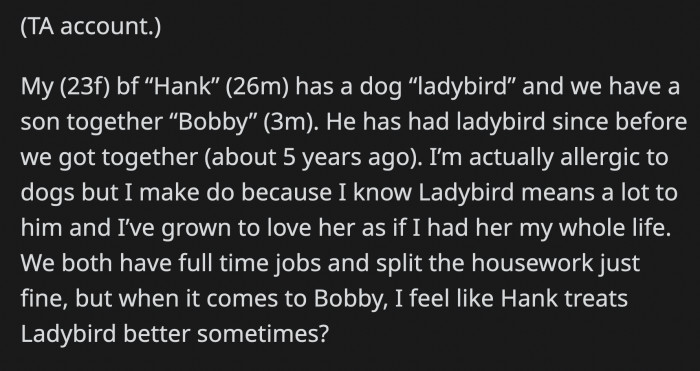
Hank was the opposite and told OP to calm down because things worked out just fine
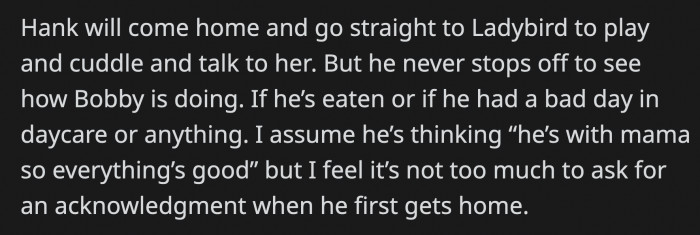
Exploring Parental Priorities
The incident raises significant questions about parental attachment styles and their implications for family dynamics. According to Dr. Mary Ainsworth's attachment theory, the way parents prioritize their relationships with their children versus pets often reflects their attachment styles.
A secure attachment style typically leads to balanced emotional responses, while anxious or avoidant patterns can create misunderstandings and conflict. Here, the mother's actions may inadvertently convey insecurity about her relationship with her boyfriend and their child.
Emotional Attachment and Priorities
Dr. Jennifer Lopez, a psychologist specializing in family dynamics at Stanford University, explains that the emotional bond between a pet and its owner can often be as significant as that between family members.
Her research indicates that people may prioritize their pets due to the unconditional love and loyalty they provide, which can sometimes overshadow human relationships.
This phenomenon is particularly evident in families where pets fulfill emotional needs that aren’t being met by other relationships.
OP was astounded by his reaction, but she bided her time
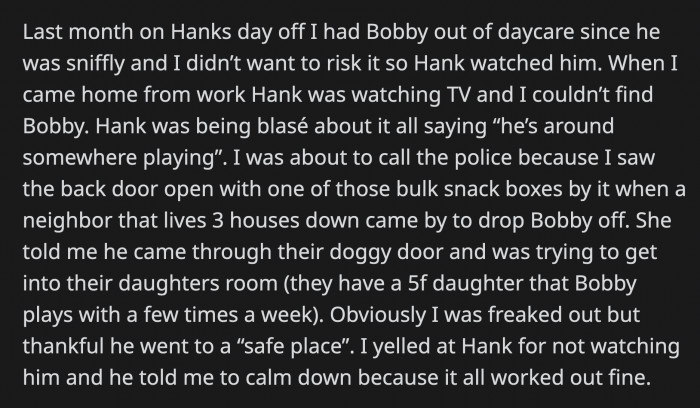
OP went home earlier than usual, took Ladybird, brought her to the neighbor, and waited for Hank to notice that Ladybird was missing
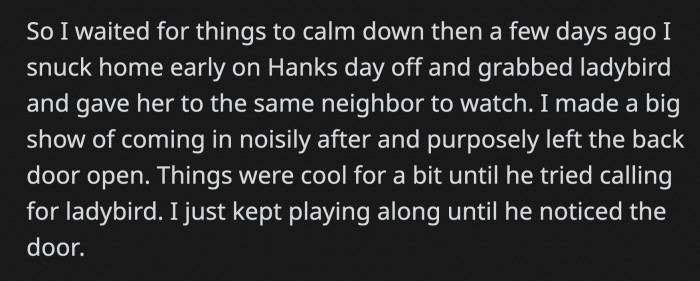
Hank panicked, told OP she was careless, and was freaking out because Ladybird could be killed by anyone outside
Hank ran outside in just his shorts and began yelling the dog's name. OP texted the neighbor to bring Ladybird back.
He was about to drive away to look for Ladybird when he saw her walking back to the house. He grabbed her and yelled at OP for being so irresponsible.
How dense can Hank be? OP told him to think about how she felt when their 3-year-old son was in the same predicament.
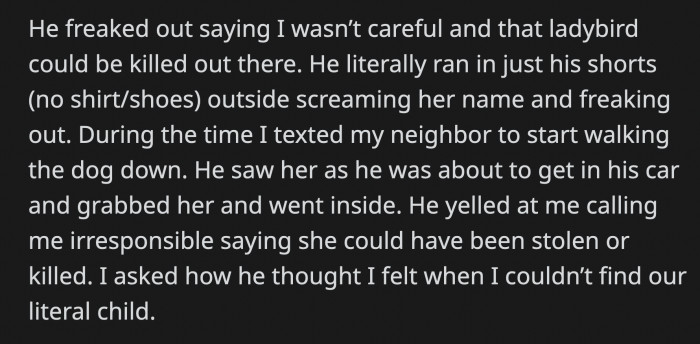
Furthermore, studies in developmental psychology suggest that children's perceptions of parental love and attention are crucial for their emotional development. The mother’s comparison between her boyfriend’s attachment to the dog and their son may be perceived by the child as a threat to their own security.
This could lead to future issues with self-worth and attachment if not addressed, emphasizing the need for clear communication about love and priorities in family relationships.
According to behavioral studies, individuals often project their emotional needs onto pets, viewing them as sources of comfort and companionship.
This can lead to conflicts when a partner feels neglected or overlooked, as they might perceive the pet as a competitor for affection.
Understanding this dynamic can help partners navigate their feelings more effectively and avoid unnecessary resentment.
Hank said the two events shouldn't be compared because nothing happened to Bobby since they live in a safe neighborhood. Hank's response left OP speechless.
OP packed a bag for herself and Bobby for them to stay at a hotel. Needless to say, OP is fuming about what happened, but her friends aren't clear if OP was right to be mad or if she should let this slide.
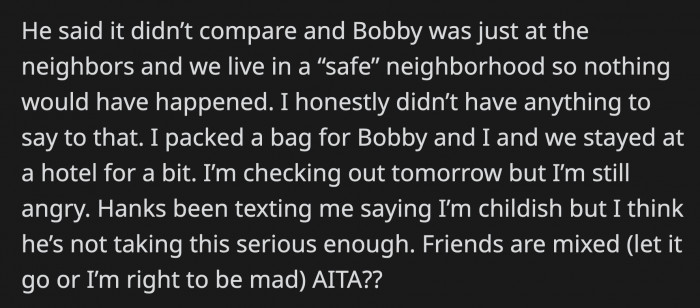
Did Hank not agree to having Bobby in the first place?

It was an unplanned pregnancy, but they both decided to keep the baby
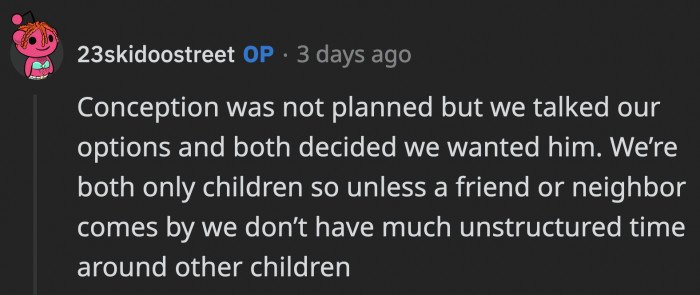
Communication as a Tool for Clarity
Effective communication is vital in navigating complex family dynamics. Theoretical frameworks like Nonviolent Communication (NVC), developed by Marshall Rosenberg, can facilitate more empathetic exchanges between family members.
By articulating feelings and needs without blame, family members can foster a more supportive environment where everyone feels heard. This approach can be particularly beneficial when discussing sensitive topics like affection for pets versus children.
The Role of Emotional Support Animals
Emotional support animals have increasingly been recognized for their therapeutic benefits.
Research published in the Journal of Psychological Science shows that pets can significantly reduce symptoms of anxiety and depression, providing emotional stability to their owners.
This attachment can complicate family dynamics, especially when one partner feels marginalized by the pet's presence.
Hank could have hidden his true feelings about having kids from OP, but it still doesn't excuse how he treats Bobby
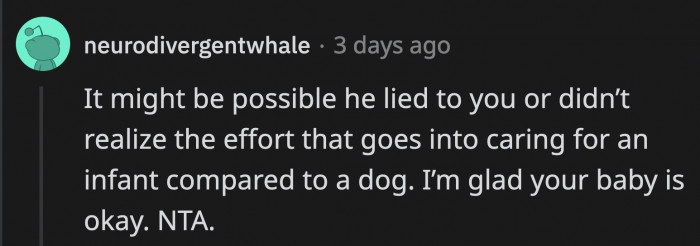
Dogs are great, but they shouldn't be above your literal toddler child

His passiveness was very alarming indeed

It may be beneficial for the mother to initiate a calm discussion with her boyfriend, emphasizing her feelings and concerns without placing blame. Couples therapy could also provide a structured environment to explore these dynamics and improve their understanding of each other’s perspectives.
Ultimately, prioritizing open dialogue strengthens family bonds and ensures that all members feel valued and secure.
To address these feelings, it's vital for partners to communicate openly about their emotional needs.
Creating a safe space for sharing feelings about both pets and personal relationships can promote understanding and reduce feelings of competition or jealousy.
Regular discussions about how each partner can support one another can also strengthen their bond.
Toddlers are little wiggly monsters, and they will escape, but Hank didn't even bat an eye when OP panicked about their son missing, which makes him a terrible parent
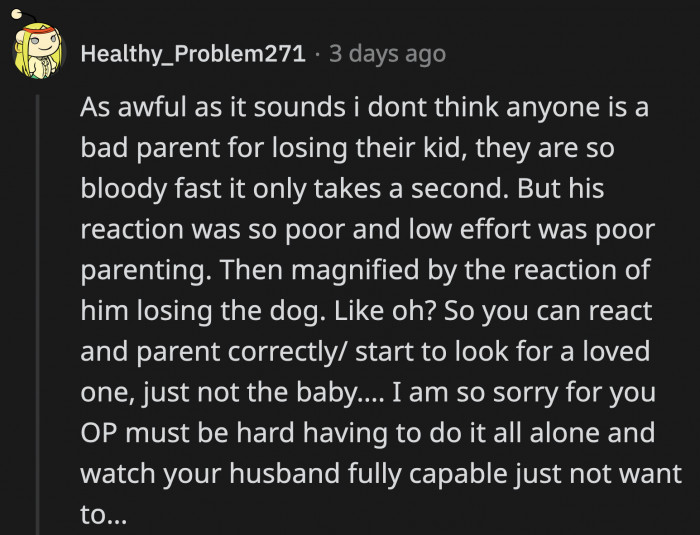
A commenter said that Hank's reaction was a deal-breaker, and OP shouldn't have wasted any time playing mind games after what happened the first time
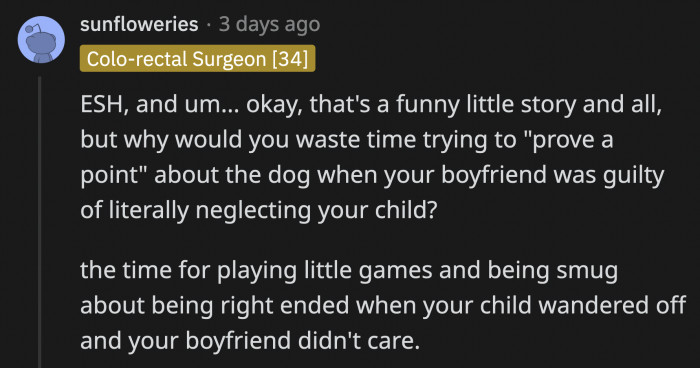
OP admitted that what she did was childish, but she needed to know for sure where Hank's priorities lay
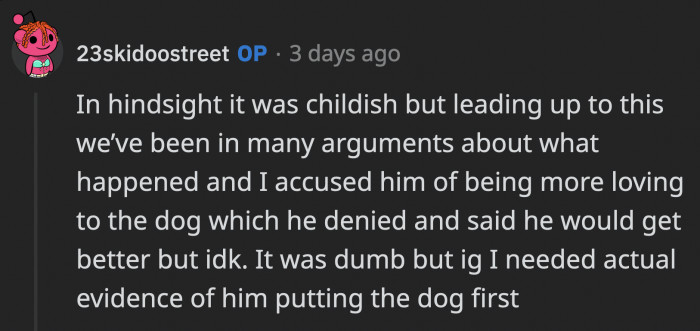
Examining Relationship Dynamics
In relationships where one partner feels less prioritized, it can create a power imbalance that leads to frustration and resentment.
Psychologists emphasize the importance of equity in relationships; both partners should feel valued and supported.
Fostering a sense of teamwork can help mitigate feelings of neglect or competition between family members and pets.
Hiding at the hotel until things calm down shouldn't be the solution to this troubling argument
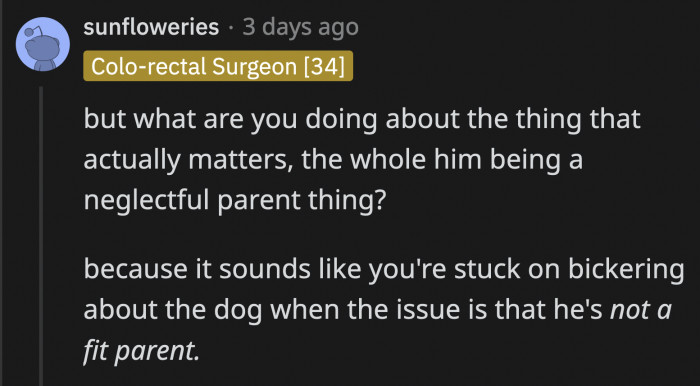
Setting up your partner to know certain things about them is not advisable, but OP is justified in this case, in my humble opinion
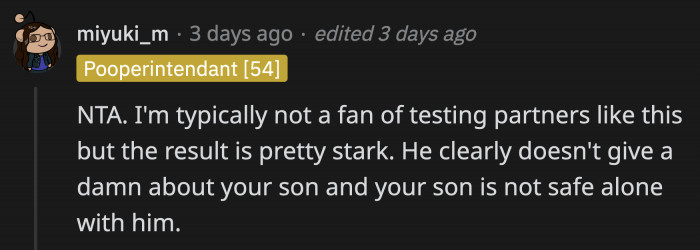
OP needed to drive her point home because Hank made no effort to understand why she was so upset
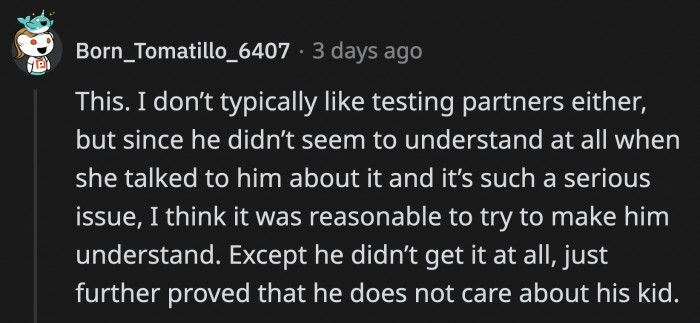
A practical approach to fostering equity is to set aside dedicated time for both partners and the pet.
Engaging in activities that everyone enjoys can help balance attention and reinforce family bonds.
Such shared experiences strengthen relationships and acknowledge the unique role each member plays in the family unit.
Hank's parental instincts aren't locked away somewhere waiting to be awakened
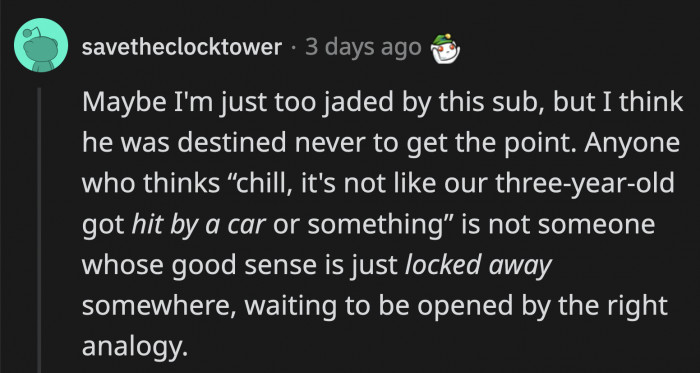
He's just an uncaring a** who can't grasp a concept unless it directly affects him. You would think that would include his child missing, but apparently not.
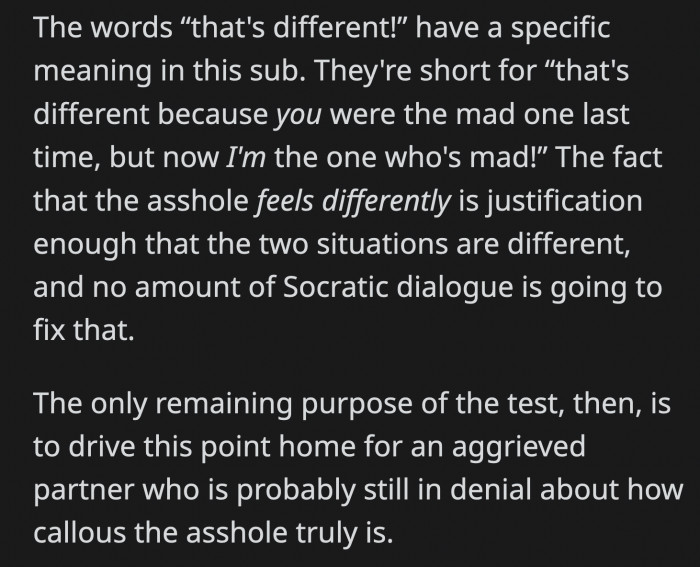
OP is definitely going to need the help of her concerned neighbor once the inevitable split from Hank happens
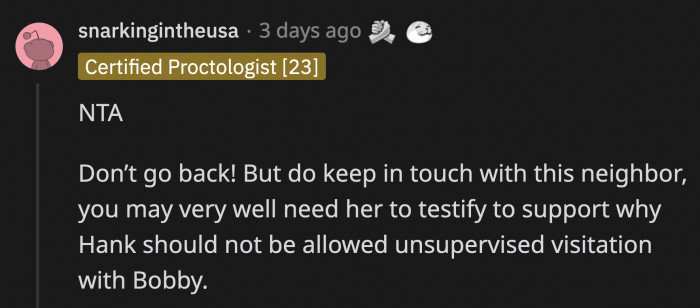
Strategies for Navigating Emotional Conflicts
To navigate conflicts stemming from pet ownership, it’s essential to establish boundaries and mutual understanding.
Setting clear expectations about pet care responsibilities can alleviate stress and prevent feelings of resentment.
Additionally, couples can benefit from exploring each other's perspectives regarding the emotional significance of pets in their lives.
OP added an update stating that she is breaking up with Hank unless he changes his questionable priorities (which we don't think will happen)
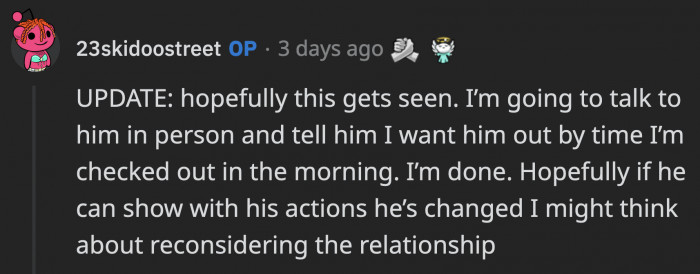
They finally called it quits, and OP is at peace with her decision to leave him. She also asked her kind neighbor to testify at the custody hearing, and she agreed to help OP.
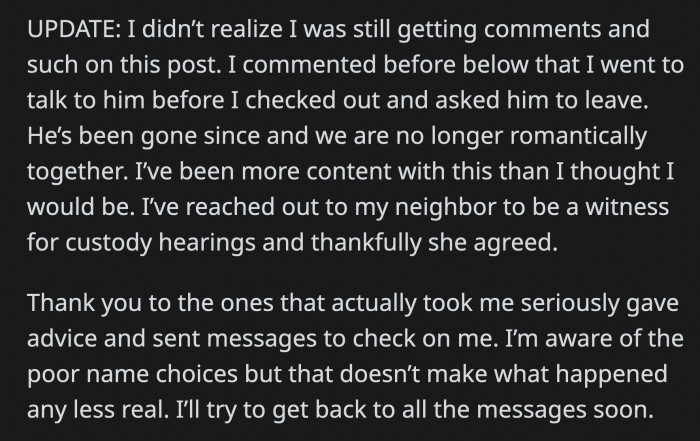
You shouldn't have to ask the father of your child to care about the kid you both agreed to have. OP shouldn't have to beg her partner to prioritize their child over his dog.
How can Hank understand that the streets can be cruel to unsupervised animals but not to a three-year-old child who just learned how to speak? If this was the last straw, I can only imagine the other blunders Hank committed.
Engaging in couples therapy can also be beneficial in addressing these complex dynamics.
Therapists can guide conversations about emotional needs, helping partners learn to express their feelings without escalating tension.
By addressing the emotional context of their relationship, couples can foster a deeper understanding and connection.
Psychological Analysis
This situation reflects the intricate interplay between emotional needs and relationship dynamics.
When one partner feels overshadowed by a pet, it can create feelings of inadequacy and resentment.
Open communication about these feelings is vital for maintaining balance and harmony in the relationship.
Analysis generated by AI
Analysis & Alternative Approaches
In conclusion, emotional dynamics involving pets can significantly impact family relationships.
By prioritizing open communication and mutual understanding, couples can navigate these complexities and strengthen their bond.
Ultimately, fostering empathy and connection will lead to healthier relationship dynamics.
Analysis & Alternative Approaches
Family dynamics can be incredibly nuanced, especially when pets are involved in the emotional landscape. Understanding attachment styles and employing effective communication strategies can mitigate conflicts and enhance relationships.
By prioritizing empathy and clarity, parents can create a healthier environment for their children, fostering emotional security and resilience.



